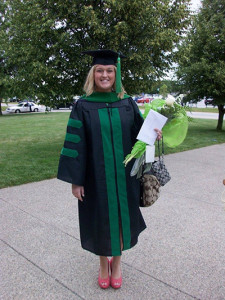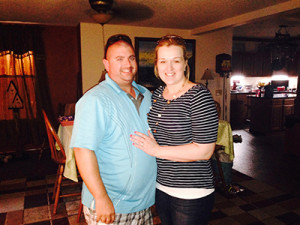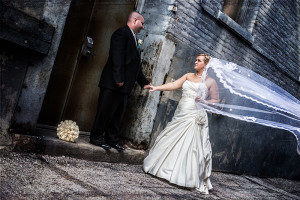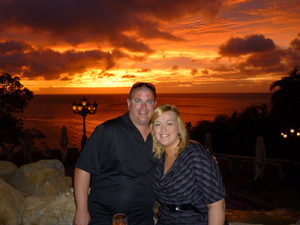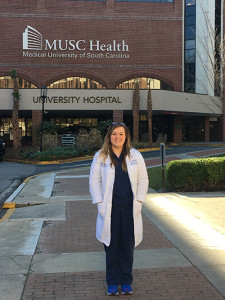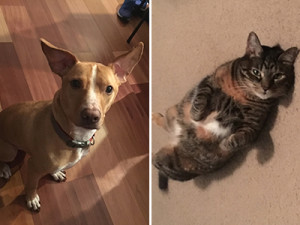Skin pathologist battles melanoma
By Vicki L. Kroll
In 2012, Dr. Nicole Dominiak was finishing her medical degree at The University of Toledo, planning her June wedding, and looking forward to moving to Charleston to start her residency in pathology at the Medical University of South Carolina.But there was a snag.
“The mole was on my back, so I really couldn’t see it very well, but I could feel it on my shoulder and it would catch on my clothing,” she recalled.
Since Dominiak (A/S ’07, Pathology Certificate ’10, Med ’12) happened to be on a dermatology rotation at UT Medical Center, she asked Dr. Lorie Gottwald, professor and chief of the Division of Dermatology, to take a look at the back of her right shoulder and the dark, raised spot that measured about 6 millimeters.
“It was bothersome, so I just wanted the mole to be taken off. I asked her to biopsy it because I knew there would be a delay if I waited to establish with a dermatologist in Charleston. And I’m very grateful that she did,” Dominiak said.
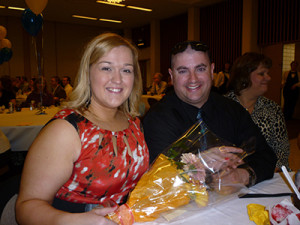
“Nicole’s mole was changing and also out of context with others on her skin, so it was biopsied,” Gottwald said. “I was somewhat surprised at the result, but if you biopsy something, the suspicion is there.”
“I got the phone call from Dr. Gottwald explaining my diagnosis. With that kind of startling news, I asked if I could come into her office. No appointment, no nothing. She said, ‘Absolutely,’” Dominiak said. “Meanwhile, while I was on my way — I didn’t know this at the time — she had called Dr. [Prabir] Chaudhuri from surgical oncology. So when I was sitting in her office, Dr. Chaudhuri came over in between his surgeries to take a look at everything and talk to me about the case.”
Eighteen hours after her diagnosis, Dominiak was in surgery. Chaudhuri performed a wider excision of the area on her shoulder and a sentinel lymph node biopsy, which showed micrometastases in two of three sentinel nodes. He then performed a completion lymphadenectomy.“Nicole is an amazing girl,” Chaudhuri, professor and surgical director of the UT Eleanor N. Dana Cancer Center, said. “She handled the tremendous obstacle of undergoing a major operation in the face of her upcoming graduation and marriage ceremony. She was always upbeat, had an extremely positive attitude, and did not allow the diagnosis of melanoma to compromise the enjoyment of the finer things in her life.”
Stage-three melanoma was one life-changer Dominiak didn’t plan on. Three weeks after surgery, she married Sean Powers, firefighter and paramedic. Seven days later, she received the doctor of medicine degree, and the newlyweds moved to Charleston two weeks after commencement.“Everyone says, ‘Oh, that’s so ironic you chose dermatopathology after your diagnosis.’ The real irony is I had already decided this was the area I wanted to specialize in and my diagnosis came after,” Dominiak said. “If I wasn’t interested in that area, if I didn’t have the knowledge that I had from being in medical school, I’m not sure my course would have been as positive and optimistic.”
Her confidence grew at the Medical University of South Carolina, where she was treated by oncologists who specialize in melanoma.“At that time, there weren’t a lot of treatments after surgery,” she said. “Pretty much the only therapy that was approved for stage-three and stage-four melanoma in the adjuvant setting was interferon. Based on the fact that I had positive sentinel lymph nodes and the depth of my tumor and after speaking with a medical oncologist, we all agreed that going that route would be the best course.”
So the 27-year-old started her pathology residency on weekdays, received interferon injections on Fridays, and had PET-CT scans every three months.
“In May 2014, during one of the routine monitoring scans, we found a nodule in my left lung. Thinking it was one nodule, and that was the only disease we could find on imaging, we pursued a surgical route,” the Toledo native said. “Because of where the metastasis was located, they had to remove an entire lobe of my left lung. Unfortunately, during surgery, they found another metastasis on the other lobe of my left lung, so they had to remove a portion of that lobe as well to remove the tumor.”
Two months later, imaging found the melanoma had metastasized to her brain.
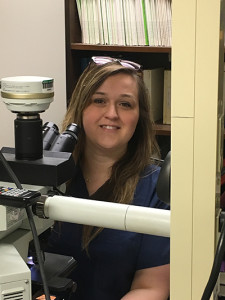
“Ipilimumab was the first immunotherapy drug to show some benefit to melanoma patients. It’s supposed to rev up your own immune system to start recognizing the tumor and attacking it,” she explained.
In August 2014, she began ipilimumab infusions and received gamma radiation for the tumors in her brain.
“For the patients it worked for, ipilimumab seemed to have a substantial and sustainable response, which was incredibly encouraging,” Dominiak said. “It was just a matter of will I be one of those patients?”
After completing the immunotherapy treatment, the young doctor learned in October the drug did not work for her.
“After I finished the entire treatment, we found out the cancer had progressed and I had more metastases — in my lung, some in my liver and in my lymph nodes,” she said.
Then a new treatment possibility emerged.“I got incredibly lucky; pembrolizumab had just been FDA-approved for use,” Dominiak said. “Pembrolizumab blocks a different receptor on your lymphocytes, but the ultimate goal is the same with all the immunotherapy: to help regulate your own immune system to recognize things that are foreign to you, the tumors, and it can begin to fight the tumors and clear them from your body.”
So far, so good.
“I’m still on the pembrolizumab, just over two years with — knock on wood — very few side effects and a fairly good response,” she said.
Through it all, she’s relied on her supportive home environment with her husband and their pets, Cooper and Nutmeg; family and friends; and specialists and colleagues at the Medical University of South Carolina.
“I share my story hoping to help just one person,” Dominiak said.
She also encourages everyone to see a dermatologist once a year for a regular skin check.
“You also should keep an eye on your own moles and look for the ABCDEs — asymmetry, border, color, diameter and evolution. If anything looks questionable, ask your physician or dermatologist to check it,” Dominiak said. “Also, sunscreen is incredibly important: Use it every day if you can.“I know when I was younger, tanning beds were very trendy. Stay away from the tanning beds.”
“Nicole has been courageous in sharing her story and stressing the importance of regular skin exams. I am proud to call her a graduate of our medical school,” Gottwald said.
“Nicole will not only always remain one of my favorite students, she will also be my role model in dealing with adversity,” Chaudhuri said.


